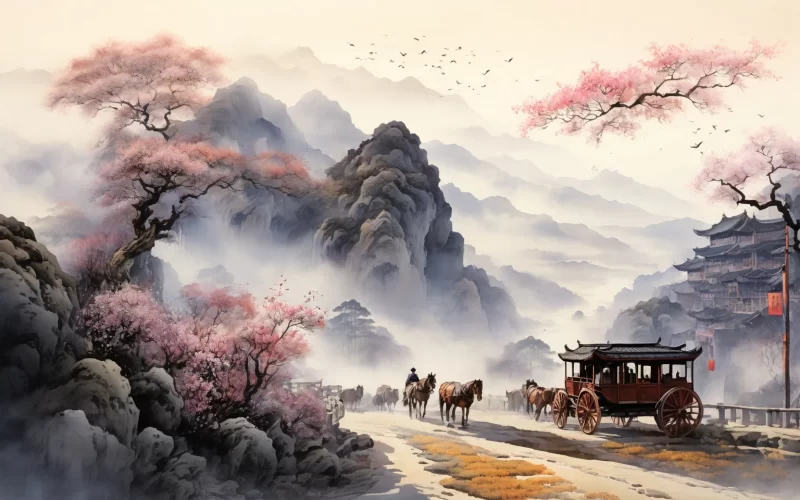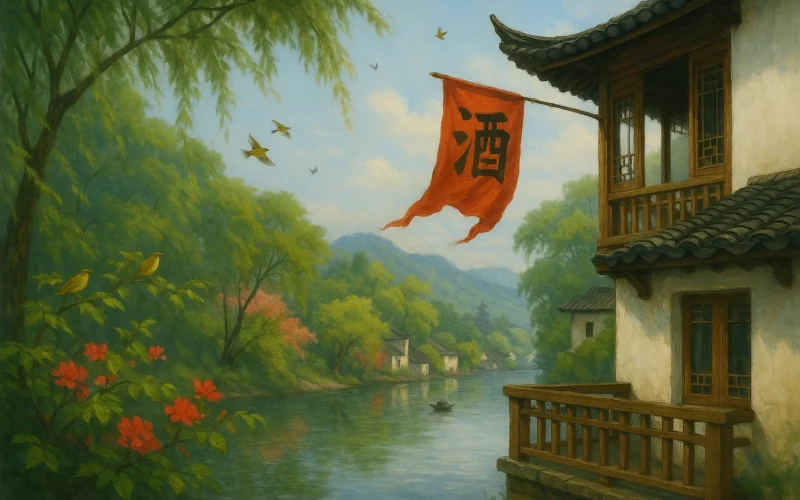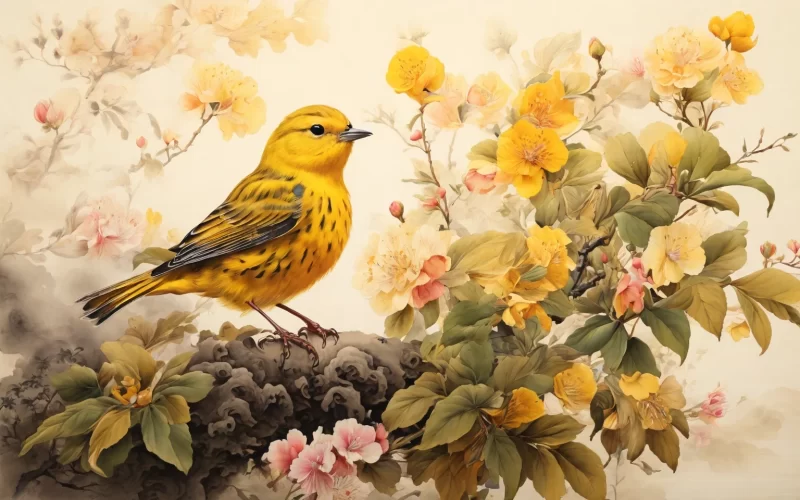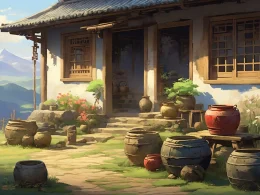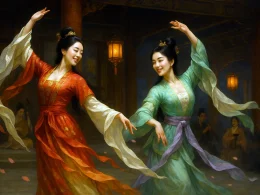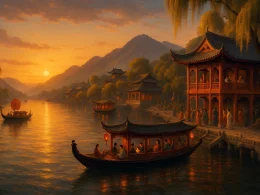At dawn I rise, with ringing bells my cab goes,
But grieved in thoughts of my home, I feel lost.
As the moon sets over thatched inn, the cock crows;
Footprints are left on wood bridge paved with frost.
The mountain path is covered with oak leaves,
The post-house bright with blooming orange trees.
The dream of my homeland last night still grieves,
A pool of mallards playing with wild geese.
Original Poem
「商山早行」
温庭筠
晨起动征铎,客行悲故乡。
鸡声茅店月,人迹板桥霜。
檞叶落山路,枳花明驿墙。
因思杜陵梦,凫雁满回塘。
Interpretation
This poem was composed by Wen Tingyun while traveling through Shangshan on his way from Chang'an to Xiangyang to seek refuge under Xu Shang, then Military Governor of Jingnan. Located in present-day Shangluo, Shaanxi, Shangshan has since ancient times been known for its secluded mountain paths and chilling atmosphere. At this time, Wen Tingyun's official career was fraught with setbacks, having repeatedly failed imperial examinations. This journey, marked by the necessity to seek patronage and live as a stranger in a foreign land, carries a sense of helplessness. The poem's depiction of a morning journey and homesickness reflects profound personal circumstances.
First Couplet: "晨起动征铎,客行悲故乡。"
Chén qǐ dòng zhēng duó, kè xíng bēi gù xiāng.
At dawn I rise to journey's bells already ringing;
This traveler's heart aches for homeland while departing.
The opening couplet directly establishes the theme, portraying the scene of morning departure. "Journey's bells" signify the traveler's identity, while the sorrow of homesickness permeates the poem like lingering night.
Second Couplet: "鸡声茅店月,人迹板桥霜。"
Jī shēng máo diàn yuè, rén jī bǎn qiáo shuāng.
Rooster crows beneath thatched inn's waning moon;
Footprints pattern frost-veiled wooden bridge at noon.
This couplet creates atmosphere through concentrated imagery, weaving space and time into a morning travel scene. Visual, auditory and tactile elements combine to present a desolate yet crisp picture.
Third Couplet: "檞叶落山路,枳花明驿墙。"
Hú yè luò shān lù, zhǐ huā míng yì qiáng.
Oak leaves descend the mountain path in flight;
Trifoliate orange blooms brighten posthouse walls with light.
Shifting to closer observation, early spring signs can't dispel the traveler's loneliness. The contrast between flowers and leaves accentuates the mountain path's solitude.
Fourth Couplet: "因思杜陵梦,凫雁满回塘。"
Yīn sī Dù líng mèng, fú yàn mǎn huí táng.
Suddenly I recall my Duling dream:
Teals and geese crowding the winding stream.
The dream's vision sharply contrasts with present reality, intensifying homesickness. Though physically on mountain roads, the poet's heart has flown home.
Holistic Appreciation
The poem's structure moves seamlessly from dawn to journey, reality to dreamscape. The opening couplet establishes the emotional tone with "journey's bells" and "homesickness," then materializes travel's chill and solitude through concrete images. The middle couplets subtly contrast early spring scenery with cold atmosphere, implying longing for warmth and stability. The concluding dream of home, with its teals and geese, heightens the traveler's loneliness and irrepressible yearning.
With refined yet unadorned language and classic imagery, the poem constructs a vivid portrait of morning travel. The poet's restrained brushwork depicts early spring wilderness, embedding travel weariness, life's helplessness and nostalgic melancholy into natural scenery—subtle yet profoundly moving.
Artistic Merits
First is the exquisite selection of imagery. Elements like "rooster crows," "thatched inn," "waning moon" and "frost-veiled bridge"—both earthy and ethereal—weave a characteristic travel scene that unifies the poet's mental state with his environment. Second, the near absence of function words, relying instead on noun accumulation and imagery combination, enhances pictorial quality and resonance. Third, the final couplet's dream-reality fusion transcends temporal and spatial limits, revealing the poet's delicate inner world.
Insights
More than a travel sketch, this poem whispers the song of a wandering life. It reminds us: however chilly the morning or helpless the journey, there always remains a "Duling dream" in our hearts. Even when hastening onward, we should preserve those tender memories of home and warmth—for these delicate affections form our soul's deepest sanctuary.
Poem translator
Xu Yuanchong (许渊冲)
About the poet
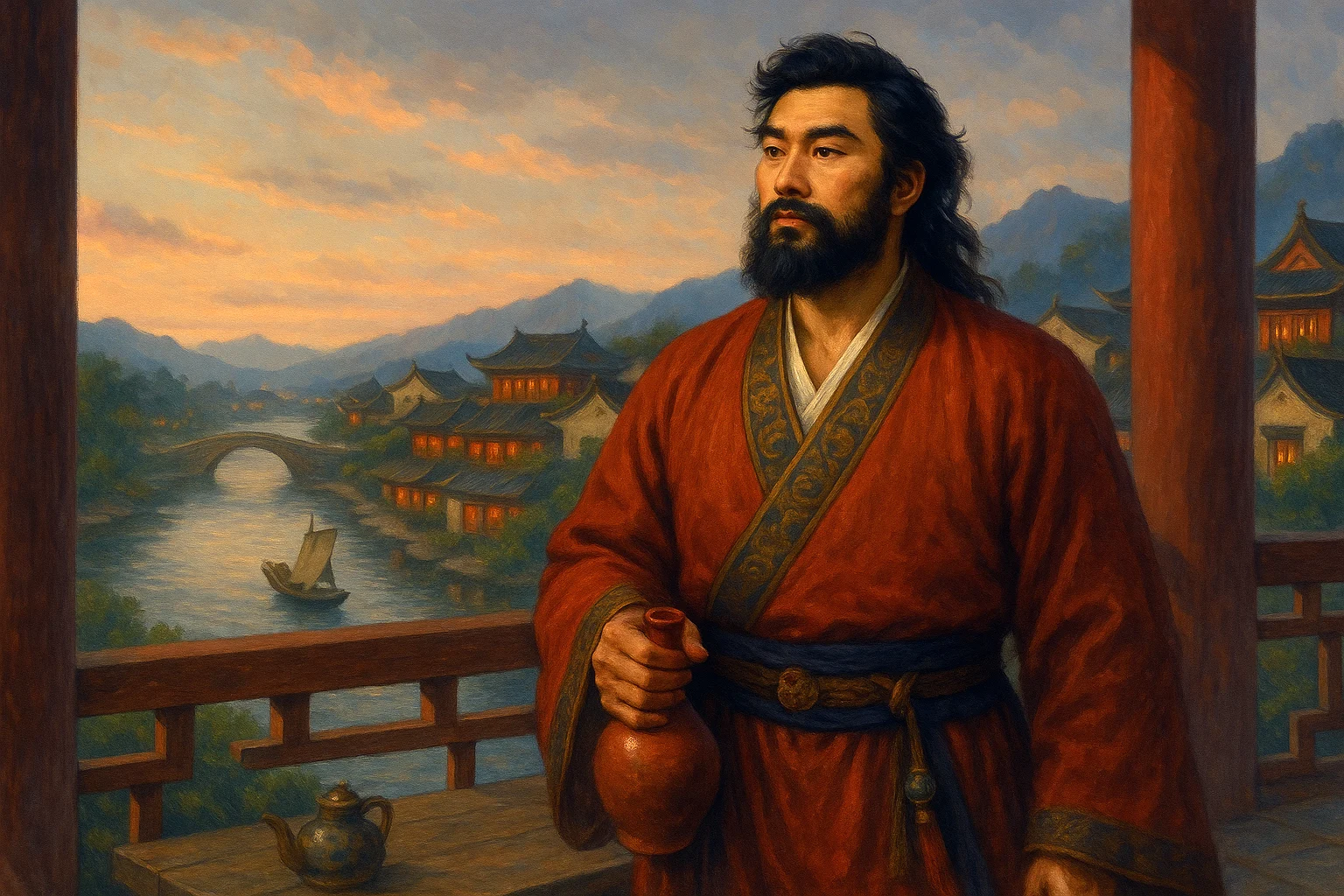
Wen Ting-yun (温庭筠) was a native of Qixian County, Shanxi, circa 813-870 AD. Wen Tingyun was a professional writer of late Tang Dynasty lyrics, whose achievements and influence were greater than that of poetry, and was once known as the “originator of the flowers”.






